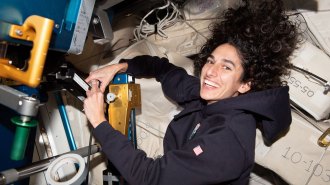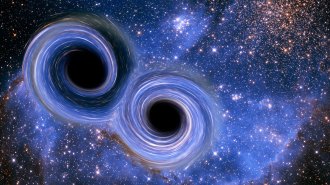Physics
Sign up for our newsletter
We summarize the week's scientific breakthroughs every Thursday.
- Physics
A ‘ringing’ black hole matches scientists’ predictions
Gravitational waves emitted after two black holes coalesced agree with theories from physicists Stephen Hawking and Roy Kerr.
-
 Particle Physics
Particle PhysicsThis laser would shoot beams of neutrinos, not light
The subatomic particles called neutrinos are famously elusive. But an unconventional trick could make a laser beam of the aloof particles.
-
 Animals
AnimalsFrilly bug feet inspire a water-striding robot
Ripple bugs’ nimble movements on the surface of water inspired a robot with automatically unfurling fans on its feet.
-
 Space
SpaceAstronauts need oxygen. Magnets could help
Adding a magnet could simplify the process of producing oxygen in space, making a crewed mission to Mars more feasible.
-
 Physics
PhysicsSunlight is all that’s needed to keep these tiny aircraft aloft
Sun-powered fliers could use photophoretic forces to hover in the mesosphere, gathering data from a region off limits to planes and balloons.
-
 Materials Science
Materials ScienceScientists re-create a legendary golden fabric from clam waste
Sea silk, once spun from endangered clams, may make a comeback — thanks to discarded fibers from a farmed species. The find could sustainably revive a fading art.
By Celina Zhao -
 Quantum Physics
Quantum PhysicsA quantum computer goes to space
Quantum computers in space could be useful for communications networks or for testing fundamental physics.
-
 Health & Medicine
Health & MedicineAn injected gel could make drugs like Ozempic last longer
GLP-1 drugs for diabetes and weight loss are difficult for some people to inject weekly. A new slow-release gel, tested in rats, could help.
By Meghan Rosen -
 Space
SpaceThe biggest black hole smashup ever detected challenges physics theories
Gravitational waves spotted by LIGO reveal two black holes, 140 and 100 times the mass of the sun, merged to become a 225 solar mass behemoth.
-
 Physics
PhysicsScientists 3-D printed a tiny elephant inside a cell
The first structures ever 3-D printed inside living cells point to applications for biology research.
-
 Quantum Physics
Quantum Physics‘Magic’ states empower error-resistant quantum computing
Special quantum states allow computers to perform the most difficult class of quantum computing operations.
-
 Physics
PhysicsNo player can return this killer shot. Physics explains how it works
Squash’s killer “nick shot” has a formula. It’s all about height and timing, a new study shows.
By Celina Zhao